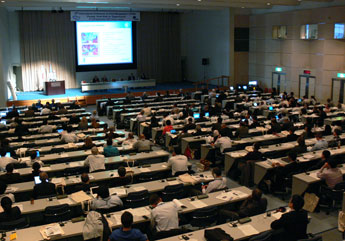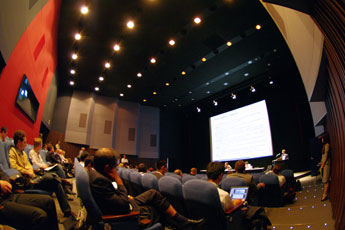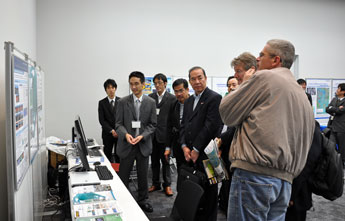5th International Conference on Flood
Management (ICFM5)
27-29 September 2011,
Tokyo-Japan
|
|
|
|
Floods: From Risk to
Opportunity
|
ICFM5 Declaration (Final version, 21 November, 2011) On 27-29 September 2011, the 5th International Conference on Flood Management (ICFM5) was held in Tokyo, Japan with more than 450 participants gathered from 41 different nations throughout the world. Following three days of extensive discussions on the important issues that communities, nations and regions face in flood management, the participants of ICFM5 declare the following as their own commitment, and appeal to all of the professionals, managers and decision makers in this important field as well as the public to carry out such statements for life security, social welfare, and enhancement of land and water related environmental management. Please click here to continue reading the Declaration or download it from the following link in PDF format.
ICFM5
Publications - Book: Large-scale Floods Report - Post- conference Publication of the Selected Full Papers
ICFM5: The Secretariat report ICHARM, ICFM5 Secretariat organized the 5th International Conference on Flood Management in Tokyo from 27 to 29 September. More than 450 participants from 41 different nations participated in the conference. The call for abstracts and on-line registration found an unexpected success. The ICFM5 Secretariat received 417 abstracts covering all the announced topic areas. More than 250 participants traveled to Tokyo from outside of Japan to join about 200 other participants who came from across Japan to attend the conference. The International Scientific Committee reviewed all submitted abstracts for relevance to the ICFM5 objectives. In total, 256 presentations were delivered during the 3-day conference at various opportunities including plenary sessions, special sessions, oral parallel and poster sessions. A few high-level experts were also invited to make presentations at the International Forum on Mega-Water Disaster in the first day of ICFM5. The ICFM5 started its first day on 27 September at the United Nations University (UNU) in Tokyo with the welcome address and opening remark by Prof. Kuniyoshi Takeuchi, director of ICHARM. Mr. Michel Jarraud (WMO Secretary General), Prof. Soon-tak Lee (UNESCO-IHP chair), Prof. Kazuhiko Takeuchi (UNU Vice-Rector) and Prof. Slobodan Simonovic (ICFM Ad-hoc Committee Chair) also spoke at the opening ceremony.
Plenary Session 1 at the UNU on 27 September
In addition to two plenary sessions on "Flood Forecasting and Early Warning Systems" and "Floods, Landslides and Debris Flows due to Torrential Downpours", the International Forum on Mega Water Disasters was held by MLIT and other governmental organizations in conjunction with ICFM5 in the afternoon of the first day. The main objective of the forum was to incorporate recent experiences and lessons learned from the Great East Japan Earthquake and Tsunami to ICFM5. Sessions of high-level experts and decision makers were convened and their discussions were reflected during the conference. His Imperial Highness Crown Prince of Japan and a few other high-ranking officials including Mr. Mir Changez Khan Jamali, the minister of the Science and Technology of Pakistan, and Mr. Rogelio Singson, the secretary of the Philippine Department of Public Works and Highways (DPHW), took part in the event. The second and third days of ICFM5 were dedicated to special, parallel and poster/exhibition sessions. All participants received a book of abstract proceedings containing more than 300 accepted abstracts in both hard copy and digital form. A copy of the first ICHARM book series on "Large-scale Flood reports" as a contribution to the International Flood Initiative was also distributed to all participants. The conference ended on 29 September after reading the draft of the ICFM5 declaration and announcing Brazil as the host of ICFM6. An Overview to the ICFM5 Technical ProgramA) International Forum on Mega-Water-Disaster and two other plenary sessions with 14 oral presentations and discussions:
B) 8 special sessions with 34 oral presentations and discussions in the following sessions:
One of the special sessions at the Akihabara UDX on 29 September C) 26 parallel sessions in nine time slots with 156 oral presentations (15 minutes including discussion) in five topic areas as follow: Topic 1: Flood Risk Management (Prevention, Mitigation and Adaptation) with 48
presentations
D) Poster sessions with 48 displayed posters on 28 and 29
September
E) Booth exhibitions with 15 organizations and companies WMO, NCDR-Taiwan, JWA, RFC, Tokyo University, IDI, ICHARM, Forum8, Pacific Consultants, Takuwa, YSI Nanotech, Yachiyo Eng., Kokusai Kogyo, Obayashi-Gumi, PASCO Corporation
Poster sessions at the Akihabara UDX F) Side Events
G) Post-conference Technical and Cultural Tours About 40 participants joined two technical tours for flood risk management to visit Arakawa and Tsurumi river. About 20 participants also joined a cultural tour of Tokyo. ICFM5 OutcomesThe ICFM5 statement acknowledges:
It also declares:
The Statement therefore agrees in the draft version :
Post-Conference Publications
AcknowledgementsICHARM would like to extend its deep gratitude and appreciation to the ICFM5 participants for the faith they had in us and tangible contribution to the success of the conference. We hope it was a fruitful conference for all of you. Please feel free to send us your comments or inquiries to the ICFM5 Secretariat at ICHARM. ICFM Contact:
|
 |
|
Organised by ICFM5 Secretariat at ICHARM/PWRI |
 |
|
|
© Copyright ICFM5 Secretariat at ICHARM/PWRI,
2011. All Rights Reserved.










